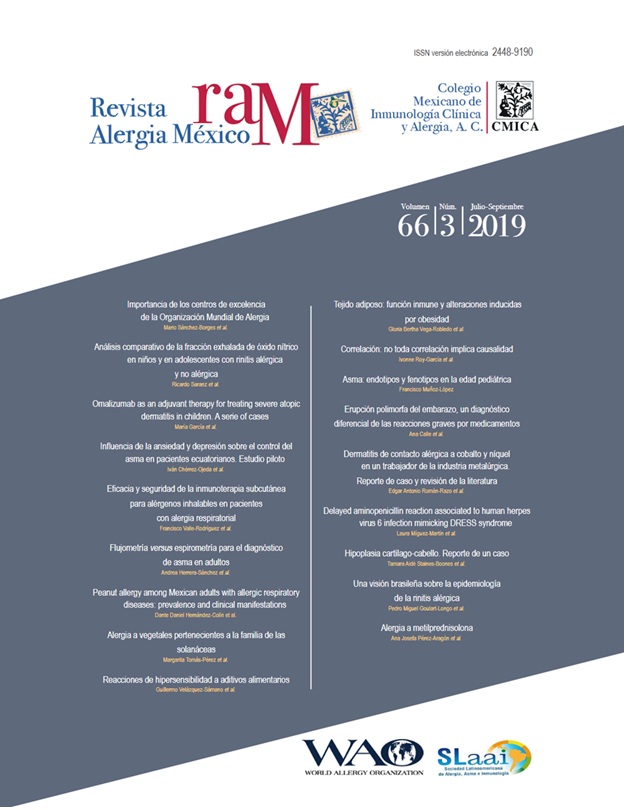Resumen
Antecedentes: La hipoplasia cartílago-cabello es una enfermedad autosómica recesiva poco frecuente, caracterizada por condrodisplasia metafisaria y cabello fino. Puede estar acompañada de alteraciones inmunológicas en distintos grados.
Caso clínico: Niña de 35 meses de edad, quien desde su nacimiento mostró restricción del crecimiento; desarrolló 11 cuadros de neumonías, síndrome de malabsorción y megacolon agangliónico, por lo que se diagnosticó hipoplasia cartílago-cabello, con expresión de inmunodeficiencia combinada no severa. Se decidió trasplante de células madre hematopoyéticas. Al momento de este informe, la paciente estaba libre de procesos infecciosos.
Conclusión: La hipoplasia cartílago-cabello es un padecimiento con rasgos clínicos y distintos grados de inmunodeficiencia. Como parte del tratamiento es posible realizar trasplante de células madre hematopoyéticas.
Referencias
Castilla-Cortázar I, Rodríguez-de Ita J, Martín-Estal I, Castorena F, Aguirre GA, García-De la Garza R, et al. Clinical and molecular diagnosis of a cartilage-hair hypoplasia with IGF-1 deficiency. Am J Med Genet A. 2017;173(2):537-540. DOI: 10.1002/ajmg.a.38052
Thiel CT, Rauch A. The molecular basis of the cartilage-hair hypoplasia-anauxetic dysplasia spectrum. Best Pract Res Clin Endocrinol Metab. 2011;25(1):131-142. DOI: 10.1016/j.beem.2010.08.004
Kwan A, Manning MA, Zollars LK, Hoyme HE. Marked variability in the radiographic features of cartilage-hair hypoplasia: Case report and review of the literature. Am J Med Genet A. 2012;158A(11):2911-2916. DOI: 10.1002/ajmg.a.35604
Riley P, Weiner DS, Leighley B, Jonah D, Holmes-Morton DJ, Strauss KA, et al. Cartilage hair hypoplasia: characteristics and orthopeadic manifestation. J Child Orthop. 2015;9(2):145-152. DOI: 10.1007/s11832-015-0646-z
McCann LJ, McPartland J, Barge D, Strain L, Bourn D, Calonje E, et al. Phenotypic variations of cartilage hair hypoplasia: Granulomatous skin inflammation and severe T cell immunodeficiency as initial clinical presentation in otherwise well child with short stature. J Clin Immunol. 2014;34(1):42-48. DOI: 10.1007/s10875-013-9962-6
Klemetti P, Valta H, Kostjukovits S, Taskinen M, Toiviainen-Salo S, Mäkitie O. Cartilage-hair hypoplasia with normal height in childhood: four patients with a unique genotype. Clin Genet. 2017;92(2):204-207. DOI: 10.1111/cge.12969
Ip W, Gaspar HB, Kleta R, Chanudet E, Bacchelli C, Pitts A, et al. Variable phenotype of severe immunodeficiencies associated with RMRP gene mutations. J Clin Immunol. 2015;35(2):147-157. DOI: 10.1007/s10875-015-0135-7
Notarangelo LD, Roifman CM, Giliani, S. Cartilage-hair hypoplasia: molecular basis and heterogeneity of the immunological phenotype. Curr Opin Allergy Clin Immunol. 2008;8(6):534-539. DOI: 10.1097/ACI.0b013e328310fe7d
Thiel CT, Mortier G, Kaitila I, Reis A, Rauch A. Type and level of RMRP functional impairment predicts phenotype in the cartilage hair hypoplasia–anauxetic dysplasia spectrum. Am J Hum Genet. 2007;81(3):519.529. DOI: 10.1086/521034
Kainulainen L, Lassila O, Ruuskanen O. Cartilage-hair hypoplasia: follow-up of immunodeficiency in two patients. J Clin Immunol. 2014;34(2):256-259. DOI: 10.1007/s10875-013-9981-3
Taskinen M, Mäkitie O. Cartilage-hair hypoplasia: much more than growth problem. Duodecim. 2011;127(3):273-279.
Shiasi-Arani K. Cartilage hair hypoplasia: first report from Iran. Med J Islam Repub Iran. 2013;27(3):157.
Kostjukovits S, Klemetti P, Valta H, Martelius T, Notarangelo LD, Taskinen M, et al. Analysis of clinical and immunologic phenotype in a large cohort of children and adults with cartilage-hair hypoplasia. J Allergy Clin Immunol Clin Exp. 2017;140(2):612-614. DOI: 10.1016/j.jaci.2017.02.016

Esta obra está bajo una licencia internacional Creative Commons Atribución-NoComercial 4.0.
Derechos de autor 2019 Revista Alergia México





